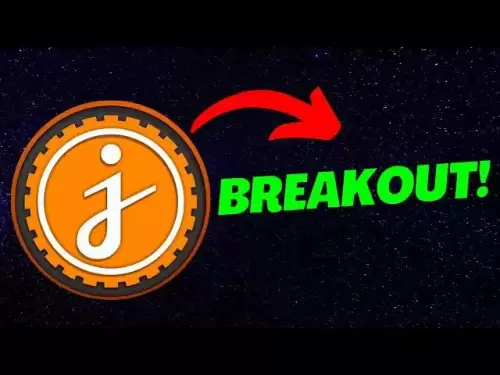-
 Bitcoin
Bitcoin $118,841.1054
1.02% -
 Ethereum
Ethereum $3,364.2689
7.44% -
 XRP
XRP $3.0337
3.93% -
 Tether USDt
Tether USDt $1.0004
0.04% -
 BNB
BNB $708.2059
2.49% -
 Solana
Solana $173.2385
5.74% -
 USDC
USDC $0.9999
-0.01% -
 Dogecoin
Dogecoin $0.2121
6.85% -
 TRON
TRON $0.3090
2.81% -
 Cardano
Cardano $0.7628
2.25% -
 Hyperliquid
Hyperliquid $46.8391
-2.08% -
 Stellar
Stellar $0.4537
0.15% -
 Sui
Sui $3.9529
-2.88% -
 Chainlink
Chainlink $16.6414
3.72% -
 Hedera
Hedera $0.2354
1.52% -
 Bitcoin Cash
Bitcoin Cash $499.1285
0.43% -
 Avalanche
Avalanche $22.6400
0.57% -
 Shiba Inu
Shiba Inu $0.0...01438
4.88% -
 UNUS SED LEO
UNUS SED LEO $8.8507
-0.64% -
 Toncoin
Toncoin $3.1498
2.35% -
 Litecoin
Litecoin $97.4954
1.21% -
 Polkadot
Polkadot $4.1541
1.50% -
 Monero
Monero $331.4406
-1.03% -
 Pepe
Pepe $0.0...01350
5.24% -
 Uniswap
Uniswap $8.9103
-5.01% -
 Bitget Token
Bitget Token $4.7540
4.51% -
 Dai
Dai $0.9999
-0.02% -
 Ethena USDe
Ethena USDe $1.0008
0.00% -
 Aave
Aave $322.3328
-1.63% -
 Bittensor
Bittensor $431.8026
-0.50%
What is "Not your keys, not your coins"
"Owning crypto means controlling your private keys—without them, you risk losing access to your funds permanently."
Jul 11, 2025 at 07:01 am
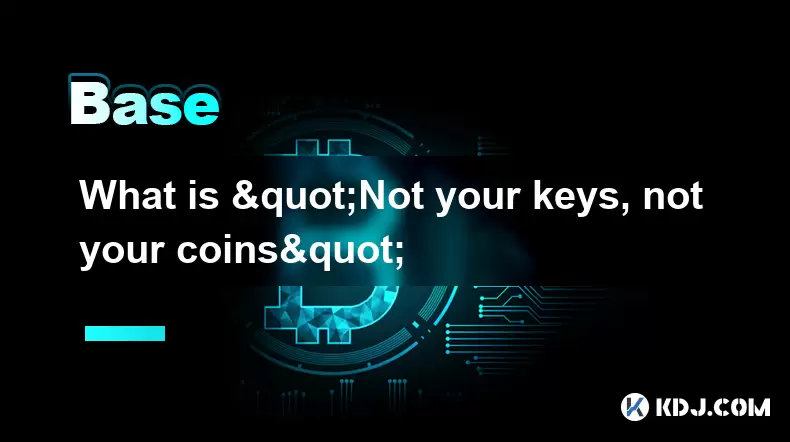
Understanding the Phrase "Not Your Keys, Not Your Coins"
The phrase "Not your keys, not your coins" is a foundational principle in the cryptocurrency community. It emphasizes the importance of personal control over digital assets. In traditional finance, individuals often rely on banks or third-party institutions to safeguard their money. However, in the decentralized world of cryptocurrencies, ownership is directly tied to cryptographic keys.
When users store their cryptocurrencies on centralized exchanges or custodial wallets, they are effectively entrusting their private keys to another entity. While this might seem convenient, it introduces risks such as exchange hacks, regulatory seizures, or platform failures. Therefore, if someone does not have access to their private keys, they do not truly own their crypto assets—they merely have an IOU from the service provider.
The Role of Private Keys in Crypto Ownership
In blockchain technology, every wallet address is associated with a private key and a public key. The private key is a secret alphanumeric code that allows the owner to sign transactions and prove ownership of the funds. Without access to this key, no transaction can be initiated or authorized.
It's important to understand that the public key, which is derived from the private key, is used to receive funds and is shared openly. However, the private key must remain confidential at all times. If someone else gains access to your private key, they can transfer your funds without your consent.
This highlights the critical nature of securing your private keys. Hardware wallets, paper wallets, and non-custodial software wallets offer ways to maintain full control over these keys. Using such methods ensures that you retain true ownership of your digital assets.
Custodial vs. Non-Custodial Wallets: A Key Difference
One of the main reasons the phrase "not your keys, not your coins" exists is due to the distinction between custodial and non-custodial wallets.
Custodial wallets are typically offered by exchanges like Binance, Coinbase, or Kraken. These platforms manage the private keys on behalf of the user. While this offers convenience and ease of use, especially for beginners, it also means the user doesn't fully control their funds.
Non-custodial wallets, such as Trust Wallet, MetaMask, or hardware wallets like Ledger and Trezor, allow users to keep their private keys under their sole control. This grants full autonomy over transactions and asset management.
If you're using a custodial wallet and the service becomes unavailable—due to technical issues, legal actions, or insolvency—you may lose access to your funds. With a non-custodial wallet, even if the associated service shuts down, you can still access your funds using your seed phrase or private key.
How to Take Full Control of Your Cryptocurrencies
To ensure that you truly own your crypto, follow these steps:
- Generate a wallet using a trusted non-custodial service like MetaMask or Electrum.
- Securely store your seed phrase in multiple offline locations. Do not share it with anyone.
- Backup your private keys and store them separately from your seed phrase.
- Avoid keeping large amounts of crypto on exchanges for extended periods.
- Verify wallet addresses before sending funds to prevent irreversible mistakes.
- Use hardware wallets for long-term storage of significant holdings.
Each of these steps contributes to reinforcing your control over your digital assets. Never reuse seed phrases or private keys across different wallets. Doing so increases the risk of compromise. Always double-check any recovery process when migrating wallets or restoring backups.
Risks of Ignoring the Principle
Failing to adhere to the "not your keys, not your coins" philosophy can lead to real-world consequences. Numerous incidents have shown how users lost access to their funds when exchanges went bankrupt, got hacked, or were shut down by regulators.
For example, the collapse of Mt. Gox in 2014 resulted in the loss of hundreds of thousands of Bitcoin. Similarly, more recent events involving FTX and Celsius Network demonstrated how dependent users were on third-party systems. Those who held their private keys were unaffected by these collapses.
Additionally, if a custodial service decides to freeze accounts or restrict withdrawals, users have little recourse. By contrast, those who control their private keys can freely move their assets at any time, without permission from any central authority.
Frequently Asked Questions (FAQ)
What happens if I lose my private key?
Losing your private key means losing access to your funds permanently. There is no recovery mechanism built into most blockchain networks, so it’s crucial to back up your keys securely.
Can I recover my crypto if I lose my seed phrase but remember my private key?
Yes, if you still have your private key, you can import it into a compatible wallet and regain access to your funds. However, without either the seed phrase or private key, recovery is nearly impossible.
Is it safe to store private keys on a mobile device?
Storing private keys on a mobile device is risky unless you're using a trusted non-custodial wallet with strong security features. For maximum safety, consider using a hardware wallet or writing down the keys on paper and storing them offline.
Do I need a separate wallet for each cryptocurrency I own?
Not necessarily. Many modern wallets support multiple blockchains and tokens. However, always verify compatibility before transferring funds. Some assets may require specific wallets for secure storage.
Disclaimer:info@kdj.com
The information provided is not trading advice. kdj.com does not assume any responsibility for any investments made based on the information provided in this article. Cryptocurrencies are highly volatile and it is highly recommended that you invest with caution after thorough research!
If you believe that the content used on this website infringes your copyright, please contact us immediately (info@kdj.com) and we will delete it promptly.
- Bitcoin Trading Volume in Q2 2025: A New York Minute
- 2025-07-17 14:30:12
- Bitcoin, SpacePay, and Your Cappuccino: The Future of Crypto Payments is Here!
- 2025-07-17 14:30:12
- Top Cryptos: Dogwifhat's Comeback, Arctic Pablo's Presale Adventure
- 2025-07-17 14:50:11
- Morgan vs. Peace: The US Mint's Silver Showdown
- 2025-07-17 14:50:11
- Ethereum Rising: Breaking $3400 – What's Fueling the Surge?
- 2025-07-17 14:55:11
- PENGU Price Watch: Resistance, Breakout, and What's Next for This Meme Coin
- 2025-07-17 14:55:11
Related knowledge
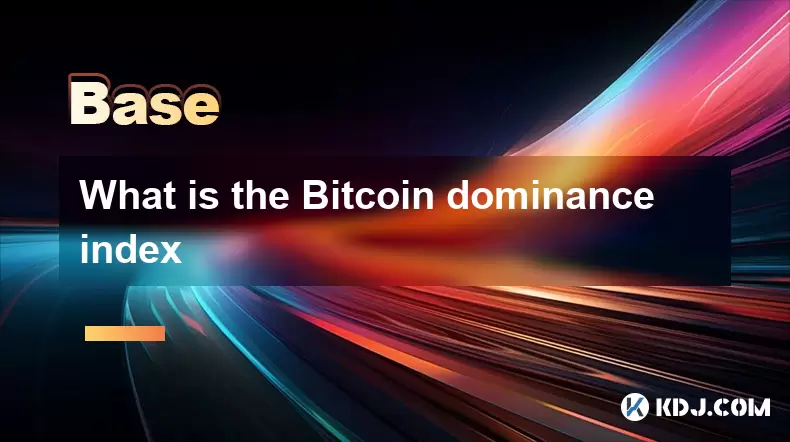
What is the Bitcoin dominance index
Jul 12,2025 at 10:35pm
Understanding the Bitcoin Dominance IndexThe Bitcoin Dominance Index, often abbreviated as BTC.D, is a metric used to measure Bitcoin's market capital...
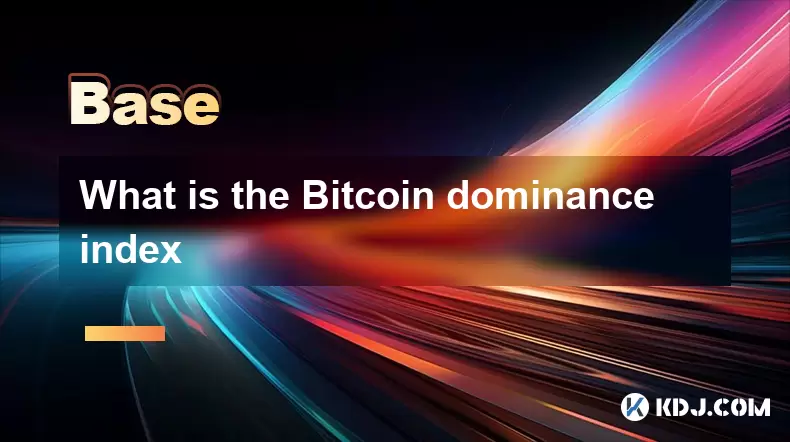
What is the Bitcoin dominance index
Jul 11,2025 at 04:29am
What is the Bitcoin Dominance Index?The Bitcoin Dominance Index is a metric used to gauge Bitcoin's market capitalization relative to the total market...

Can crypto be a hedge against inflation
Jul 14,2025 at 12:21am
Understanding the Concept of Hedging Against InflationInflation refers to the general increase in prices and fall in the purchasing value of money ove...
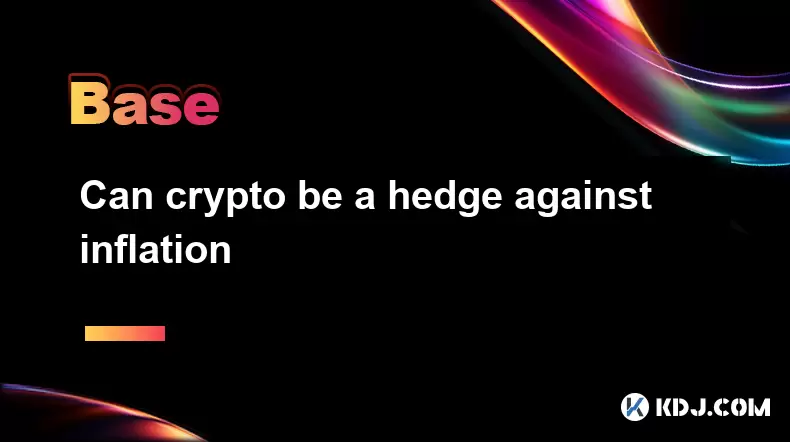
Can crypto be a hedge against inflation
Jul 12,2025 at 12:07pm
Understanding the Role of Blockchain in Decentralized Finance (DeFi)Blockchain technology serves as the backbone of decentralized finance, offering a ...
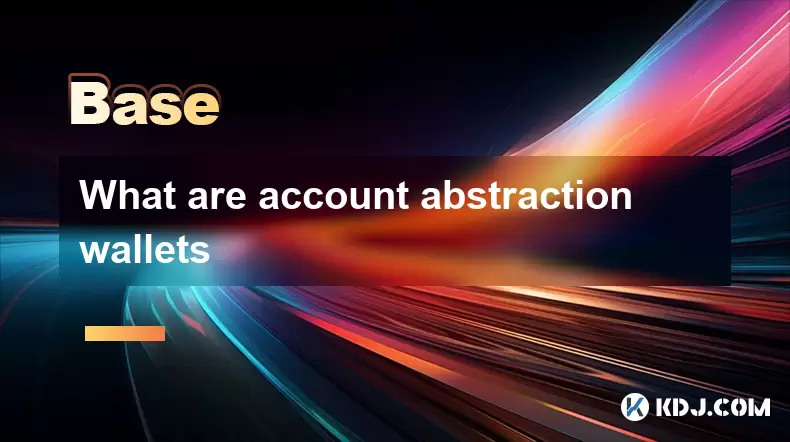
What are account abstraction wallets
Jul 13,2025 at 01:43am
Understanding the Concept of Account AbstractionAccount abstraction is a term frequently used in the Ethereum ecosystem, particularly within discussio...
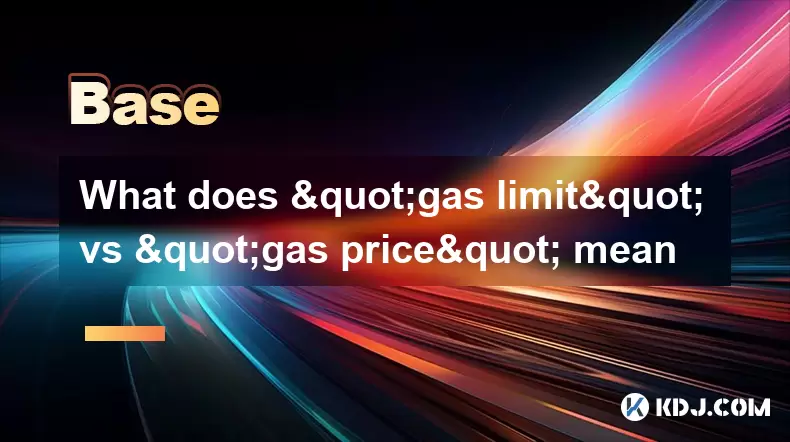
What does "gas limit" vs "gas price" mean
Jul 13,2025 at 04:00am
Understanding the Basics of Gas in Blockchain TransactionsIn the Ethereum and other EVM-compatible blockchains, every transaction requires computation...

What is the Bitcoin dominance index
Jul 12,2025 at 10:35pm
Understanding the Bitcoin Dominance IndexThe Bitcoin Dominance Index, often abbreviated as BTC.D, is a metric used to measure Bitcoin's market capital...

What is the Bitcoin dominance index
Jul 11,2025 at 04:29am
What is the Bitcoin Dominance Index?The Bitcoin Dominance Index is a metric used to gauge Bitcoin's market capitalization relative to the total market...

Can crypto be a hedge against inflation
Jul 14,2025 at 12:21am
Understanding the Concept of Hedging Against InflationInflation refers to the general increase in prices and fall in the purchasing value of money ove...

Can crypto be a hedge against inflation
Jul 12,2025 at 12:07pm
Understanding the Role of Blockchain in Decentralized Finance (DeFi)Blockchain technology serves as the backbone of decentralized finance, offering a ...

What are account abstraction wallets
Jul 13,2025 at 01:43am
Understanding the Concept of Account AbstractionAccount abstraction is a term frequently used in the Ethereum ecosystem, particularly within discussio...

What does "gas limit" vs "gas price" mean
Jul 13,2025 at 04:00am
Understanding the Basics of Gas in Blockchain TransactionsIn the Ethereum and other EVM-compatible blockchains, every transaction requires computation...
See all articles
























